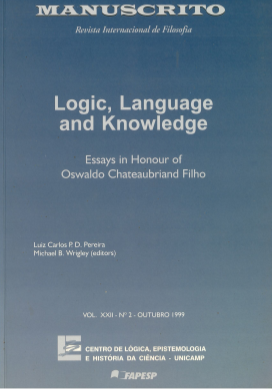Resumo
O propósito deste trabalho será o de examinar o problema da relação entre a lógica e a filosofia, tomando, como ponto de partida, a chamada concepção linguística da lógica. A nossa estratégia será a de considerar tal questão a partir de vários textos do lógico polonês J. Lukasiewicz e avaliar, até que ponto, suas ideias a respeito da relação entre a lógica, a filosofia e a matemática são esclarecedoras do ponto de vista conceitual.
Referências
Carnap, R. (1958). Empiricism, Semantics, and Ontology. In: Meaning and Necessity. (Chicago, The University of Chicago Press).
Carnap, R. (1958). Introdution to Symbolic Logic and Its Applications. (New York, Dover Publications, Inc).
Carnap, R. (1959). The Logical Syntax of Language. (London, Routledge & Kegan Paul).
Curry, H. (1970). Outlines of a Formalist Philosophy of Mathematics. (Amsterdam/London, North-Holland Publishing Company).
Euclides. (1956). The Elements. (New York, Dover Publications Inc.).
Halmos, P & Steven, G. (1998). Logic as Algebra. (New York, The Mathematical Association of America).
Hilbert, D. (1971). The Foundations of Geometry. (La Salle, The Open Court Publishing Company).
Lukasiewicz, J. (1957). Aristotle’s Syllogistic from the Standpoint of Modern Formal Logic. (Oxford, Oxford University Press).
Lukasiewicz, J. (1975a). Logistica y Filosofia. Estudios de Logica y Filosofia. (Madrid, Revista de Occidente, S.A.), pp. 109-126.
Lukasiewicz, J. (1975b). Em Defesa de la Logística Estudios de Logica y Filosofia (Madrid, Revista de Occidente, S.A.), pp. 127-139.
Mates, B. (1972). Elementary Logic. (New York, Oxford University Press).
Poincaré, H. (1902). Les Fondements de La Géométrie. Bulletin des Sciences Mathématiques, 26: 249-272.
Quine, W.V. (1960). Word & Object. (Cambridge, Mass., The MIT Press).
Quine, W.V. (1980). From a Logical Point of View. (Cambridge, Mass., Harvard University Press).
Quine, W.V. & Goodman, N. (1947). Steps Toward a Constructive Nominalism. Journal of Symbolic logic, 12 (4): 105-122.
Reichenbach, H. (1947). Elements of Symbolic Logic. (New York: The Macmillan Company).
Rosser, J. B. (1953). Logic for Mathematicians. (New York, McGraw-Hill Book Company).
Russell, B. (1959). On the Scientific Method in Philosophy. Mysticismm and Logic. (New York, Routledge), pp. 96-120.
Russell, B. (1985). Introdution to Mathematical Philosophy. (London, George Allen & Unwin).
Russell, B. (1995). Our Knowledge of the External World. (New York, Routledge).
Shoenfield, J. (1967). Mathematical Logic. (London, Addison-Wesley Publishing Company).
Skolem, T. (1981). Some Remarks on Axiomatized Set Theory. In Heijenoort, J. van., (ed.). From Frege to Gödel. A Source Book in Mathemathical Logic, 1879-1931. (Cambridge, Mass., Harvard University Press), pp. 290-301.
Tarski. A. (1952). The Semantic Conception of Truth. In: Linsky, L., (ed.). Semantics and the Philosophy of Language. (Urbana, The University of Illinois Press), pp. 341-74.
Wang, H. (1981). From Mathematics to Philosophy. (New York, Van Nostrand Reinhold Company).

Este trabalho está licenciado sob uma licença Creative Commons Attribution 4.0 International License.
Copyright (c) 1999 Manuscrito: Revista Internacional de Filosofia

